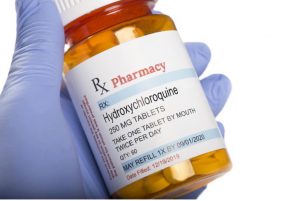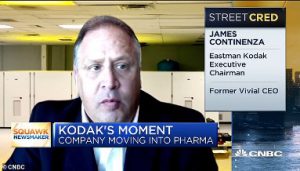On August 26, 2020, a class action complaint was filed against Kodak for violations of federal securities laws. The complaint alleged that Eastman Kodak (“Kodak”) and its Executive Chairman, James V. Continenza (“Continenza”), made materially false and/or misleading statements and failed to disclose key information regarding the statements. These statements were related to COVID-19, so it drew lots of attention.  This caused a sharp rise in the price of Kodak’s stock, and a subsequent crash when the truth came to light. I am interested in seeing the extent of the damages, if any, available for stockholders involved in the following events that were alleged in the complaint.
This caused a sharp rise in the price of Kodak’s stock, and a subsequent crash when the truth came to light. I am interested in seeing the extent of the damages, if any, available for stockholders involved in the following events that were alleged in the complaint.
On July 27, 2020, the price of Kodak’s shares increased by $0.52 per share, nearly 25%, closing at $2.62 per share on an unusually heavy trading day of 1.645 million shares. Before the market opened on July 28, Dow Jones published an article reporting that Kodak had won a $765 million government loan (“Loan”) under the Defense Production Act to help expedite domestic production of drugs, including  hydroxychloroquine that President Trump touted for the treatment of coronavirus. Additionally, before the market opened on July 28, Kodak and the U.S. International Development Finance Corporation (“DFC”) issued a joint statement confirming this deal. This news caused Kodak’s shares to reach an intra-day high of $11.80 per share and close at $7.94 per share, about 203% higher than the closing price of $2.62 per share on July 27, the day before.
hydroxychloroquine that President Trump touted for the treatment of coronavirus. Additionally, before the market opened on July 28, Kodak and the U.S. International Development Finance Corporation (“DFC”) issued a joint statement confirming this deal. This news caused Kodak’s shares to reach an intra-day high of $11.80 per share and close at $7.94 per share, about 203% higher than the closing price of $2.62 per share on July 27, the day before.
 Before the market opened the next day, July 29, Continenza was interviewed on CNBC’s Squawk Box, where he stated that “we can bank” on the deal. He was also asked about the high volume the day before the official announcement, where he responded, “I don’t know. I mean obviously, this has been a pretty tight-kept secret obviously even into the last day basically so uhm… I couldn’t tell you what influenced that or didn’t.” As a result of Continenza’s statements, Kodak’s shares skyrocketed to an intra-day high of $60 per share and closed at $33.20 per share, $25.26 per share higher and more than 318% greater than the closing price of $7.94 per share the day before.
Before the market opened the next day, July 29, Continenza was interviewed on CNBC’s Squawk Box, where he stated that “we can bank” on the deal. He was also asked about the high volume the day before the official announcement, where he responded, “I don’t know. I mean obviously, this has been a pretty tight-kept secret obviously even into the last day basically so uhm… I couldn’t tell you what influenced that or didn’t.” As a result of Continenza’s statements, Kodak’s shares skyrocketed to an intra-day high of $60 per share and closed at $33.20 per share, $25.26 per share higher and more than 318% greater than the closing price of $7.94 per share the day before.
After the market closed on July 29, the Wall Street Journal published the first news suggesting wrongdoing by Kodak. The article stated that Kodak sent a news advisory to media outlets without indicating that the information was not intended to be released publicly, leading to the leaks in tweets and news stories from television stations in Kodak’s hometown of Rochester, N.Y.
On July 30, the first trading day following this news, Kodak’s shares fell by $3.37 per share, more than 10%, to close at $29.83 per share. The next trading day, July 31, shares then declined an additional $7.98 per share, nearly 27%. However, worse news came over the weekend. Reuters and other news sources reported that Defendant Continenza was granted options for 1.75 million shares on July 27, the day before the announcement, based on an informal and non-binding “understanding” with the Company’s board. On August 3, the first trading day following this news, Kodak’s shares fell $6.91 per share, or 31.6%, to close at $14.94 per share.
Then, on August 4, multiple news sources reported that Senator Elizabeth Warren had asked U.S. regulators to examine possible insider trading before Kodak’s July 28 announcement. Simultaneously, news circulated that Kodak’s disclosure of the Loan and the stock surge were already under examination by the U.S. Securities and Exchange Commission (“SEC”). Following this news, Kodak’s shares fell $0.54 per share, about 3.6%, to close at $14.40 per share on August 4. On the morning of August 7, the Company issued a press release and filed a Form 8-K with the SEC announcing that the Kodak Board had opened an internal review of the disclosure of the $765 million DFC Loan. Following this news, Kodak’s shares fell $1.23 per share, about 7.6%, to close at $14.88 per share on August 7. Also, after the market closed on August 7, the DFC issued a tweet indicating that the Kodak loan had been put on hold in light of the allegations of wrongdoing.
On August 10, 2020, the first trading day following the news, Kodak’s shares fell by $4.15 per share, nearly 28%, to close at $10.73 per share. Then on August 11, Dow Jones published an article stating that according to a filing with the SEC during the prior week, one of Kodak’s Board members, George Karfunkel, had made a suspiciously-timed gift of 3 million shares (at its inflated value) to a congregation in Brooklyn, New York on July 29, valued at over $116 million. On August 11, Kodak’s shares continued to fall, declining by $0.72 per share, about 6.7%, to close at $10.01 per share.
After the market closed on August 11, in connection with the Company’s release of its financial results for the second quarter, Kodak held a conference call during which Continenza repeatedly referred to the loan as a “potential loan,” in stark contrast to his statements on July 29. Additionally, Continenza said that “we … support the DFC’s decision to wait for clarification before moving forward with the loan process.” Following this news, Kodak’s shares declined further by $0.29 per share, or 2.9%, to close at $9.72 per share on August 12.
As of market close on March 31, 2021, the price of a Kodak share was $7.90.



 This caused a sharp rise in the price of Kodak’s stock, and a subsequent crash when the truth came to light. I am interested in seeing the extent of the damages, if any, available for stockholders involved in the following events that were alleged in the complaint.
This caused a sharp rise in the price of Kodak’s stock, and a subsequent crash when the truth came to light. I am interested in seeing the extent of the damages, if any, available for stockholders involved in the following events that were alleged in the complaint. hydroxychloroquine that President Trump touted for the treatment of coronavirus. Additionally, before the market opened on July 28, Kodak and the U.S. International Development Finance Corporation (“DFC”) issued a joint statement confirming this deal. This news caused Kodak’s shares to reach an intra-day high of $11.80 per share and close at $7.94 per share, about 203% higher than the closing price of $2.62 per share on July 27, the day before.
hydroxychloroquine that President Trump touted for the treatment of coronavirus. Additionally, before the market opened on July 28, Kodak and the U.S. International Development Finance Corporation (“DFC”) issued a joint statement confirming this deal. This news caused Kodak’s shares to reach an intra-day high of $11.80 per share and close at $7.94 per share, about 203% higher than the closing price of $2.62 per share on July 27, the day before. Before the market opened the next day, July 29, Continenza was interviewed on CNBC’s Squawk Box, where he stated that “we can bank” on the deal. He was also asked about the high volume the day before the official announcement, where he responded, “I don’t know. I mean obviously, this has been a pretty tight-kept secret obviously even into the last day basically so uhm… I couldn’t tell you what influenced that or didn’t.” As a result of Continenza’s statements, Kodak’s shares skyrocketed to an intra-day high of $60 per share and closed at $33.20 per share, $25.26 per share higher and more than 318% greater than the closing price of $7.94 per share the day before.
Before the market opened the next day, July 29, Continenza was interviewed on CNBC’s Squawk Box, where he stated that “we can bank” on the deal. He was also asked about the high volume the day before the official announcement, where he responded, “I don’t know. I mean obviously, this has been a pretty tight-kept secret obviously even into the last day basically so uhm… I couldn’t tell you what influenced that or didn’t.” As a result of Continenza’s statements, Kodak’s shares skyrocketed to an intra-day high of $60 per share and closed at $33.20 per share, $25.26 per share higher and more than 318% greater than the closing price of $7.94 per share the day before.